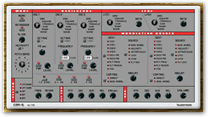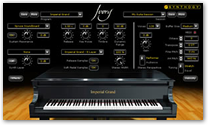
|
Interview with Shane Adams
I was born and raised in Las Vegas, Nevada. My mom was our church's choir director so our family was always singing. I started writing songs in High School and eventually attended Berklee College of Music where I studied Songwriting and Music Business. My first big "break" came when I was asked last minute to be the piano bar sub at Durgin Park, a famous restaurant in Boston's Quincy market. My first night, I only knew a couple of Billy Joel and Elton John covers, but I had to fill up four hours. I was terrible, playing extended versions of those songs over and over. The management really liked me though, so I crammed and learned 30 or 40 songs every week for two months. It was trial by fire. Their regular piano player ended up quitting and I took his spot. Soon I was playing 4 nights a week for almost 4 years. What is your measure of success? Being able to support my family by working in the music business. Either by composing, teaching for Berklee, and building recording systems for Pro Audio Solutions. My motto has always been "Don't quit, and work harder than everyone else". Tell us about your own project studio facility in Nashville. What kind of projects do you do? What artists have you worked with? My production company, Shane Adams Productions, (visit: www.ShaneAdamsOnline.com) has worked with the Susan G. Komen foundation, LGPA, and I've scored and produced the music for the motion picture "Fortune Cookie" (featured at the Sundance Film Festival and won awards at the Hollywood Film Festival). I am currently producing a couple of jazz artists and working on my own CD with Deseret Book Music. I also arrange and play piano for SheDaisy. How would you summarize the technology changes to our industry that have occurred since you started? Do you think all the changes have been for the better? Most changes have been for the better. The ability to create quality recordings in one's own living room has created a fertile environment for self expression. This is especially true for songwriters. It is easy to share files among various project studios and collaborators. You can take your time to make every part perfect without looking at the clock and checking your wallet. The downside is there are fewer recording experts. The quality of final mixes aren't as strong, but far more people can get into the game. Tell us about your approach to songwriting, and about teaching songwriting as an online instructor for Berkleemusic.com. Going to Berklee was an amazing experience, and now being able to teach their lyric and songwriting courses is one of the most important parts of my life. I have students from South Africa, India, Japan, as well as soccer moms from Seattle. It is such an inclusive environment. My courses have old songwriting road warriors sharpening their craft along with newbies who always wanted to write stronger songs. My approach is fairly simple: 1) Go with your gut for as long as you can, and 2) if/when you get stuck, apply the techniques we teach in the courses. You don't have to give up your individuality, and your creativity is based on a solid foundation of practical techniques that apply to all genres. Tell us about how you use Receptor? Why did you buy it? How did you first learn about Receptor? How do you use it? What is there about the device that you think makes it special? When I first saw a Receptor, I "got it" immediately. I was so tired of my plug-ins, especially Ivory, completely bogging down my computer (even though I had built a fairly powerful system). I also wanted to have an amazing piano for my live gigs. I've now set up hundreds of Receptor systems for my clients at Pro Audio Solutions. My guys really put the Receptor through its paces…scoring for HBO, writing for Broadway, recording for Faith Hill, Tim McGraw, Kenny Chesney. I've set up Receptors for Grammy Award winning songwriters and some of the top record producers in the industry. Everybody wants one because it runs so well and is so versatile. I just built a 5 Receptor system for a film scoring facility in Washington D.C. A Receptor allows (finally) multiple plug-ins to run at full capacity. I love the ADAT & SPDIF routing options. The analog outputs put out an extremely hot signal with no system noise. My Receptor Pro is pretty beat up from taking it all over the country, but it continues to function like a champ. On top of that, the tech support guys at Muse Research are amazing. I've had some extremely complex MIDI/ethernet routing issues for some of my clients, and the tech guys stay with me until the job is done and working flawlessly. You get a person instead of an answering machine. What are your top 5 free plug-ins?
What are your top 5 commercially available plug-ins?
Stylus RMX, Trilogy, Atmosphere, and Lounge Lizard are my other staples. |







